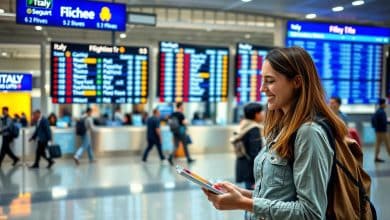Travel Safety Guidelines: Ensuring a Secure Journey Abroad
Anúncios
In today’s world, knowing how to stay safe while traveling is key. Whether you’re going abroad or exploring new places, safety is crucial. This article will share important travel safety tips to help you stay safe.
Before you leave, it’s important to prepare well. Knowing what to do in case of emergencies can make a big difference. Staying informed and aware of your surroundings is also vital.
By following these guidelines, you can enjoy your travels more. You’ll feel confident and worry less about safety. So, let’s dive into the details of how to stay safe while traveling.
Understanding the Importance of Travel Safety
Travel safety is about protecting people from risks when they visit new places. It’s key to know these safety steps to have a safe trip. By focusing on safety, travelers can avoid dangers.
Defining Travel Safety
Travel safety means using strategies to keep safe while traveling. It includes knowing your surroundings, following local laws, and staying updated on health and safety abroad.
Why It Matters for Travelers
Putting safety first makes travel more enjoyable. It helps reduce stress and makes the trip better. Safety lets travelers enjoy different cultures and places without fear.
The Impact of Unsafe Travel
Ignoring safety can cause serious problems, like injuries or crime. Such issues can ruin trips and leave bad memories. Knowing the risks shows why safety is crucial for good travel experiences.
Preparing for Your Trip
Getting ready for a trip is key to a safe journey. Start by researching your destination. Learn about the culture, politics, and society there. This knowledge helps you feel more at ease in new places.
Researching Destinations
Do your homework by reading travel blogs and guides. Look at forums specific to your destination. This info helps you understand local customs and safety tips. It makes your trip better.
Knowing Local Laws and Customs
It’s important to know the local laws and customs. Not knowing can get you into trouble. Each place has its own rules and traditions. Respect them to avoid problems.
Travel Insurance Considerations
Don’t forget about travel insurance. It covers unexpected things like medical emergencies or trip cancellations. Having insurance lets you relax and enjoy your trip without worry.
Packing Smart for Safety
Traveling means you need to be ready for safety. A good travel safety checklist is key. It helps you choose the right items for a safe journey.
Essential Safety Gear for Travelers
Right gear is crucial for a safe trip. Make sure to pack these travel safety essentials:
- Personal alarms to deter threats
- First-aid kits for minor injuries
- Travel locks to secure luggage
- Flashlights for emergencies
Minimizing Valuables and Risk
Carrying less valuable items reduces theft risk. Think about what you really need. Leave expensive jewelry and gadgets at home for peace of mind.
Health and Safety Supplies
Health and safety supplies are a must for any trip. Don’t forget to pack:
- Medications and prescriptions
- Hand sanitizers to prevent illness
- Sunscreen for skin protection
- Reusable water bottles for hydration
Staying Informed on Travel Advisories
Travelers need to know about current events and safety risks. Getting reliable travel safety info makes trips better. Knowing about travel advisories helps take safety steps early.
Monitoring Government Travel Alerts
Government travel alerts are key for safety. They tell you about safety levels in different places. By checking U.S. State Department alerts, you learn about risks like natural disasters or health issues.
This info helps you plan safer trips. It lets you know what to avoid and when.
Utilizing Travel Apps and Resources
Today, many apps and websites share travel safety tips. Apps like the Smart Traveler App send alerts and tips for foreign travel. Local embassy websites also offer safety updates and emergency contacts.
Using these tools keeps you informed and ready for your trip.
Following Local News Updates
Local news is important for understanding your surroundings. News can share safety tips, cultural events, or law changes. Following local news helps you stay safe and adjust your plans.
Transportation Safety Tips
Keeping safe while traveling is key. It’s important to pick the right transport and stay alert. This helps make your trip safer, whether you’re using public transport, taxis, or rental cars.
Choosing Safe Transport Options
Choosing safe transport is the first step. Use trusted taxi services or apps like Uber or Lyft. Never get into a car with someone you don’t know.
Guidelines for Public Transportation
Public transport is great for saving money and time. But, you need to be careful. Stick to official transport systems to avoid risks. Here are some tips:
- Stay alert and aware of personal belongings.
- Plan routes in advance and familiarize oneself with stops.
- Avoid displaying valuables while commuting.
Rental Car Safety Best Practices
Rental cars offer freedom. But, safety is crucial. Always check the car before driving. Here are more tips:
- Keep doors locked and windows closed when parked.
- Avoid leaving valuables in plain sight inside the car.
- Familiarize oneself with local driving laws.
Accommodation Safety Measures
Choosing the right place to stay is key to travel safety. A secure lodging not only makes your stay comfortable but also keeps you safe. It’s important for a worry-free trip.
Selecting Secure Lodging
When planning your trip, pick a safe place to stay. Here are some tips to help you:
- Read reviews from other guests to see if it’s safe.
- Choose hotels or hostels with security like cameras and staff on duty 24/7.
- Stay in areas that are well-lit and busy.
In-Room Safety Practices
After you check in, there are steps you can take to stay safe. Here’s how to protect your things:
- Always lock your door with the deadbolt and any extra locks.
- Keep valuable items hidden or in the hotel safe.
- Know where the emergency exits are and what to do in case of an emergency.
Emergency Contacts and Plans
Being ready for emergencies is crucial when you travel. Knowing who to call and having a plan can help keep you safe:
- Learn the local emergency numbers for police, fire, and medical help.
- Find the closest hospital or police station.
- Tell family or friends back home where you are and how to reach you.
Navigating Risks While Traveling
Traveling can be a rewarding experience, but it also comes with risks. It’s important for travelers to take steps to protect themselves. Knowing how to avoid scams and stay safe in dangerous areas is crucial. Following the advice of travel experts can greatly improve your safety while traveling.
Awareness of Common Scams
Many places have scams targeting tourists. Knowing the common tricks can help you avoid them. Here are a few examples:
- Overcharging: You might be charged too much for things. Always agree on prices before buying.
- Distraction Theft: A thief might distract you while someone else steals. Stay alert and avoid distractions.
Avoiding Dangerous Areas
Knowing the local area is key. Talk to locals or guides to find out which areas to avoid. Use travel safety tips from reliable sources to find out about high-crime areas. Carry a map and ask locals for safe routes to stay safe.
Managing Personal Safety
Keeping yourself safe involves being aware of your surroundings. Here are some tips:
- Be careful in crowded places where pickpockets might be.
- Make copies of important documents like passports and keep them separate.
- Have a plan for emergencies, like telling friends or family where you are.
Digital Safety While Traveling
Technology has made digital safety while traveling crucial. Travelers must protect their personal info to stay safe. Knowing travel safety tips helps keep both physical and digital safety in check, making trips smoother.
Protecting Personal Information
Travelers need to keep their personal data safe. Don’t share sensitive info unless it’s really needed. Use strong, unique passwords for all accounts to lower the risk of hacking.
Update your passwords often and use two-factor authentication. These steps greatly improve your security when traveling abroad.
Using Wi-Fi Safely
Free Wi-Fi in public places is handy but risky. Use Virtual Private Networks (VPNs) to secure your online activities. Always choose private networks over public ones for sensitive transactions.
Knowing the risks of public Wi-Fi helps prevent data breaches while traveling.
Managing Online Transactions
Be careful with online transactions. Stick to trusted booking sites and secure payment methods to avoid scams. Check your bank statements regularly while traveling to spot any odd activities fast.
Following these steps keeps your financial info safe and boosts your travel safety.
Emergency Preparedness
Emergency preparedness is key in travel safety. It means having a plan for unexpected situations. Making an emergency plan is the first step.
Creating an Emergency Plan
Travelers should make a plan for different situations. This plan might include:
- Identifying evacuation routes
- Locating nearby hospitals and police stations
- Setting meeting points in case of separation
This plan helps travelers feel ready for anything.
Understanding Local Emergency Services
Knowing local emergency services is important. Find hospitals and police stations nearby. This helps in emergencies.
Keep their contact info handy. This way, help can come fast when needed.
Communication During a Crisis
Staying in touch during emergencies is vital. Have a backup plan, like an international phone plan. This helps connect with family and authorities.
Share your plan with loved ones. Keep in touch to stay safe while traveling.
Returning Home
When you get back from a trip, it’s important to check your stuff and your home. This helps make sure everything is safe and sound. You should look over your valuables, check your house for any signs of trouble, and make sure you have all your travel gear.
Post-Travel Safety Checks
Right after you get home, take a few minutes to make sure everything is okay. Look through your luggage for anything you might have left behind. This includes important things like your passport or travel plans. Also, check your home’s security systems to make sure they’re working right.
Reporting Lost or Stolen Items
If you find out something is missing, tell the police or the bank right away. This is especially true for things like stolen luggage or lost credit cards. Doing this quickly can help you get your stuff back and avoid bigger problems.
Reflecting on Travel Experiences
Thinking about your trip after you get back can help you travel safer next time. You can figure out what worked well and what didn’t. This way, you can make your next trip even better and safer.
FAQ
What are some essential travel safety tips for international travel?
How can I prepare for potential emergencies while traveling?
What should I do if I lose my passport or important documents while abroad?
How can I stay safe when using public transportation?
What precautions should I take regarding digital safety while traveling?
What should I include in my travel safety checklist?
Why is it important to monitor government travel alerts?
How can I assess the safety of my accommodation before booking?
Published on: 5 de February de 2025

Luke Martin
Luke Martin, author of Credwallets.com, is a mathematics graduate with a specialization in financial markets. Known for his love of pets and his passion for sharing knowledge, Luke created the site to provide valuable insights into the complexities of the financial world. His approachable style and dedication to helping others make informed financial decisions make his work accessible to all, whether they're new to finance or seasoned investors.







